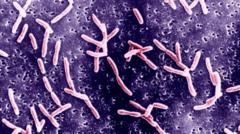In Pune, India, a recent outbreak of Guillain-Barré Syndrome (GBS) has led to around 160 reported cases and multiple hospitalizations linked to the pathogen campylobacter jejuni. Health authorities are mobilizing to monitor and manage the situation as concerns about public health and sanitation grow.
India Confronts Guillain-Barré Syndrome Outbreak Amid Public Health Concerns

India Confronts Guillain-Barré Syndrome Outbreak Amid Public Health Concerns
An alarming surge in Guillain-Barré Syndrome (GBS) cases in Pune, India, is raising concerns, with health officials tracing the outbreak to a specific pathogen linked to contaminated food and water.
In recent weeks, the city of Pune, known for its educational and IT infrastructure, has been grappling with an unsettling outbreak of Guillain-Barré Syndrome (GBS), a rare neurological disorder. A six-year-old boy, who initially struggled to hold a pencil, was one of the first recognized cases, quickly declining to a state requiring ventilator support. He is among about 160 reported GBS cases since early January, with five suspected fatalities, leaving health officials on high alert.
GBS manifests with symptoms like tingling and muscle weakness, escalating over a period of two to four weeks, predominantly starting from the extremities. The severity of cases in Pune has necessitated increased medical attention, with 48 patients currently in intensive care, 21 on ventilators, and 38 discharged according to health reports.
Experts are linking the outbreak to a strain of campylobacter jejuni, a pathogen commonly associated with foodborne diseases. Historical data shows a connection between this bacterium and GBS, first established in 1990s China. In recent months, similar outbreaks linked to the same pathogen have emerged worldwide, indicating a troubling pattern.
Research conducted by Indian neuroscientists revealed that over a third of the GBS patients they studied, from 2014 to 2019, had tested positive for campylobacter. In 2023, Peru has also reported significant GBS cases linked to campylobacter, prompting a national health emergency there.
GBS cases connected to campylobacter are less frequent in countries characterized by stringent hygiene standards, whereas other triggers like respiratory infections or viral diseases, including the Zika virus, have also been noted in various geographical locales.
Professor Hugh Willison from the University of Glasgow noted that while campylobacter is widely present, developing GBS from it is rare. A specific strain with a similar molecular structure to nerve cells poses a potential risk when the immune system mistakenly attacks both the bacteria and the nerves.
There's an ongoing challenge in diagnosing GBS as there is no singular test available, and misdiagnoses can occur, particularly in rural areas of India where healthcare access is limited. In a bid to counteract the outbreak, the World Health Organization is assisting local health departments in Pune to monitor and control the situation.
Local authorities have taken preventive measures, including extensive surveillance in the community, water testing, and education on safe food practices. As health officials advise the public to avoid undercooked food and dubious water sources, they stress the importance of remaining calm, although uncertainty persists regarding the outbreak's precise origins, whether from tainted water supplies or contaminated poultry products.
This growing health crisis highlights the necessity for improved public health infrastructure and awareness in managing infectious disease outbreaks, particularly in densely populated urban centers.




















